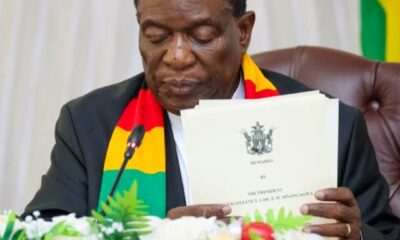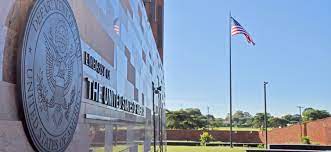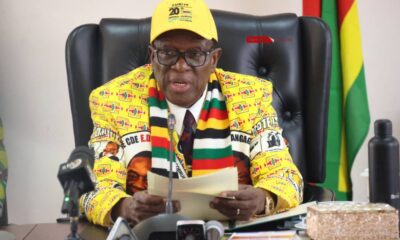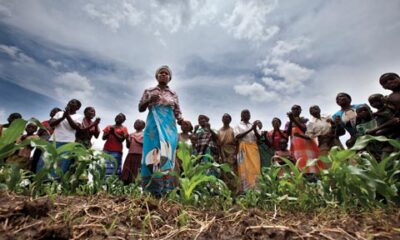
News
New wave of land seizures from vulnerable black farmers
Published
3 years agoon
By
NewsHawksTHE arbitrary removal of indigenous black farmers from communal and commercial land around the country – in a wave of new disruptive state-sponsored farm seizures – has brought into question President Emmerson Mnangagwa’s seriousness in protecting property rights, rule of law and foreign investors’ interests.
NYASHA CHINGONO/BRIDGET MANANAVIRE
This focusing a government which came to power through a 2017 coup chanting noisy mantras like “new dispensation”, “Zimbabwe is open for business” and “ED Pfee” – a crude Zanu PF slogan – to euphoric and anticipative Zimbabweans who wanted change.
More than 20 years after the chaotic fast-track land redistribution programme began, Zimbabwe is still grappling with agrarian disruptions as farm invasions and evictions, bordering on lawlessness, continue unabated.
Just last week, for example, Mwenezi district lands officer Boas Vurayayi in the company of Nyika businessman Leonard Mutema visited Battlefields Farm in the Mateke area to notify workers for Shelton Lucas – a black Zimbabwean farmer – that his farm had been allocated to Mutema.
As a result, a US$69.4 million farming and training project meant to benefit 30 000 people within five years is under threat as government wants to repossess the 714-hectare farm, which had attracted investors from Germany.
The new wave of land grabs is gathering momentum, in some cases resulting in the eviction of people allocated land during the fast-track redistribution programme. Indigenous commercial farmers, including those who bought land, have not been spared.
Communal and commercial farmers are bearing the brunt of new dispossessions.
Since after the coup, government has upped the ante on black land seizures, a new dynamic in agricultural and electoral politics.
Vast tracts of land have been grabbed and parcelled out to Mnangagwa loyalists, while farmers are forced to downsize and make way for his cronies or political allies.
While Mnangagwa claims “Zimbabwe is open for business”, the brazen land grabs tell a different story, with many convinced he is still walking on his mentor, the late former president Robert Mugabe’s ruinous path.
Oxford-trained Zimbabwean academic Dr Phillan Zamchiya, senior researcher at the Institute for Poverty, Land and Agrarian Studies (PLAAS) at the University of the Western Cape, and others, have done a critical research, titled The silent dispossession of customary land rights holders for urban development in Zimbabwe, on how government is seizing land from poor and vulnerable rural communities, as well as critics of authorities.
Zamchiya studies contemporary trajectories of land and agrarian change in Southern Africa and the politics of post-colonial states in democratic transitions. He is currently the regional coordinator of PLAAS’s new project on the privatisation of customary land and women’s land rights in Mozambique, South Africa, Zambia and Zimbabwe.
International human rights lawyer Siphosami Malunga, speaking during a webinar on the new land dispossessions this week, said farm seizures prove deep-seated abuse of power by the current government following in Mugabe’s disastrous footstep.
Malunga’s farm, which he owns with busines partners, in Nyamandlovu in Matabeleland North province is being seized by government despite that he bought it, violating private property.
This breaches the law and government policy.
In terms of the law, government cannot seize land owned by black people. From a policy perspective, government did not grab dairy farms, which that farm was.
Advocate Thabani Mpofu has obtained a judgement to that effect.
“We give the government an opportunity to relook at their decision before we take the fight to the next level. There is even a judgement by Justice (Nicholas) Mathonsi on this issue, particularly in relation to manipulation of power, the abuse of power and authority, especially in relation to the security services sector. And we know there are times when the government has decided to intervene on this serious abuse of power by its officials,” Malunga said.
Before the farm invasion, Malunga received several threats from a top state security official, adding that it was a calculated ploy to eject him from the land.
“Somebody instrumentalises that and says, hey you know what, the government is unhappy with you, you’re talking too much, you are over-criticising them. This organisation that you lead, you are a serious regime change agent. Then you are told the government is going to take over your farm because of this. As a matter of fact, Professor (Jonathan) Moyo’s farm was referenced, that as soon as we are done with Professor Moyo and Saviour (Kasukuwere) we are coming to your farm. Of course, my response was: Do your worst, we will be waiting. Then you realise it is an individual who has taken interest, and then you begin to see everything taking place and a minister has signed. I was shocked because I had always praised the minister, thinking they are professionals,” Malunga said.
Communal land under siege
Communal farmers, whose ancestors were removed from their prime land to desolate areas known as reserves during pre-independent Zimbabwe, have been on the receiving end of state-sponsored land grabs.
These include the Chilonga people in Chiredzi, Masvingo province, whom the government wants to move under the guise of establishing a lucerne grass project, although villagers say minerals are the real reason behind the eviction.
Despite several pleas from traditional leaders who fear that thousands of locals will lose their ancestral land and livelihoods, the government has continued to ride roughshod over rural communities.
In a letter objecting to the “dubious” issuance of an exclusive prospecting order (EPO) by President Emmerson Mnangagwa to mining giant Premier African Minerals in his area without following due process, Chief Jahana of Insiza in Matabeleland South reminded the President of how he had condemned the mortgaging of land for mineral wealth.
“In your November 24, 2017 acceptance speech as President of the Second Republic, you condemned the mortgaging of Zimbabweans future through the dubious issuance of mining EPOs, national strategic business permits and licences to foreigners, 99-year farm leases to foreigners without following due diligence and processes, which includes the grassroots consultation background check of beneficiaries and national security vetting,” Chief Jahana Khumalo said in the letter dated 14 May, copied to the Zimbabwe Defence Forces commander, General Philip Valerio Sibanda and the Matabeleland South Provincial Chiefs Council.
“It’s exactly 42 months later after you promised not to mortgage the future of Zimbabweans but the situation in my area proves you otherwise. Mining EPOs are issued by your offices after you have consented hence this letter to you.
“Take note that the due process of issuing a Lithium exploration EPO at Fort Rixon, in our area of jurisdiction with Chief Sibasa, was not followed. As chiefs, custodians of this area, we only read about this mining venture from state media.”
Chief Jahana’s letter was in a bid to stop lithium and tantalum explorations in Fort Rixon.
In 2018, Chief Vezi Maduna Mafu wrote to Mnangagwa about the secret issuance of 17 EPO in Matabeleland South, particularly the EPO for lithium which covers Shapi-Mahongola- Gwabatema in Guyu-Ntepe-crossing Tuli River.
“This means we have no land as chiefs for economic devolution which you proclaimed since all mining EPOs where given to Harare guys and considering precedence Mining EPQ have over any activity in that area or land,” Mafu, a fearless chief who fought colonial authorities, said.
“Grabbing of prime agriculture land using fronts like (I) Trek at Maphisa. (2) Schweppes at Zhovhe Dam in Beitbridge; I have information whose interest these companies are serving as business fronts at the expense of the local people.”
Mnangagwa’s regime has successfully used lawfare to issue repressive statutory instruments, where the President can convert communal land into state land, dispossessing thousands of vulnerable families, bringing into question the government’s sincerity in empowering indigenous black farmers.
In the Dinde area, in the coal-rich Hwange district in the western part of the country, villagers are also on the edge following manoeuvres to evict them to pave way for a Chinese coal project.
The villagers are angry the Chinese commenced exploration without consulting the local community.
The situation bears resemblance to the Chilonga saga in which the government early this year ordered the removal of 12 000 villagers from their ancestral land in Chiredzi.
The Chilonga people had been ordered to vacate their ancestral land to pave way for a lucerne grass project run by Dendairy, a company linked to Mnangagwa’s business associates.
Following a public outcry, the government abated its decision, but the situation remains precarious as investigations show Chilonga area lies on a rich diamond belt, explored by South African diamond giant De Beers in the 1950s which connects to the Beitbridge and Musina gem precincts.
Former cabinet minister Jonathan Moyo said: “If you look at the case of Chilonga, it is powerful individuals working with cartels elevating it to policy through instruments.”
In the past decade, communal farmers have been forced off their ancestral lands without consultations and being given alternative places.
These include the Marange people who were in 2010 evicted when the government discovered diamonds. No compensation has been given to the Marange people, nearly a decade after the bloody diamond rush.
While other evictions have gone unnoticed, people in Mwenezi were evicted in 2014 to make way for a massive dam. The evictions cost the farmers livestock and livelihoods. They remain stuck in Chingwizi camp without proper housing, nearly a decade later.
In Chisumbanje, communal farmers were also evicted to make way for an ethanol project in 2010.
In a shocking turn of events, at least 200 villagers from Maganga village near Marondera who invaded land belonging to Hunyani Estate at the onset of Zimbabwe’s chaotic fast-track land redistribution programme in 2000 have also evicted.
ln September 1998, with UK encouragement, the Zimbabwe government hosted a Land Conference in Harare, involving all major international donors and the multilateral institutions. Before that government encouraged land invasions to create a volatile situation to push for change.
The Maganga area is located in Marondera East, 20 kilometres from the town. It is under Chief Svosve, who mobilised his people to invade white-owned farms in 1998, igniting the land reform programme. Prior to the Svosve land invasions, black communities had actually invaded land in Nyamandlovu, Matabeleland North province.
The Svosve people, with the encouragement of the late Chief Svosve Enock Gahadza Zenda, armed with hoes and axes, moved into the Ruzawi commercial farming belt east of Marondera in 1998.
Hunyani Estate, with an eviction order and backed by heavily armed riot police, forcibly evicted the Maganga villagers. The villagers were dumped near the Harare-Mutare road.
A study titled Silent Dispossession of Customary Land Rights Holders for Urban Development in Zimbabwe by Zamchiya, Owen Dhliwayo, Cynthia Gwenzi and Claris Madhuku found that seizures of communal land are connected to Zanu PF or its bigwigs.
“Most beneficiaries were the locally employed, urban elites based as far as Harare and locals who worked in Johannesburg, South Africa, and the local ‘big shots’. The local ‘big shots’ were largely connected to the ruling Zanu PF and this gave them power and authority over the allocation of land, sometimes challenging council authorities,” the study says.
The study further shows that land seizures are entrenching colonial and authoritarian ideologies of dispossessing indigenous black communities.
“We observed that the Zimbabwean state, which prides itself in the politics of decoloniality, is dusting and making live colonial masterplan maps rooted in authoritarian high modernism ideologies, which were meant to dispossess the black communities of their prime land, to dusty and mountainous areas,” it says.
The study adds that land grabs had been triggered by new investments, rent-seeking behaviour, and state officials’ high modernist visions. It shines the spotlight on violence associated with evictions in which court orders are not abided by.
“It is evident that we need more research to proffer wider and concrete solutions. However, given the rising demand for customary land, not only in Chipinge but across rural Zimbabwe, it is imperative for policy to clearly define land use rights. Our view is that the Communal Land Act of 1982 vests too much power and authority over land in the minister, Rural District Councils and the President,” the study says.
“In addition, the new Customary Land Act must legally recognise socially legitimate existing traditional occupation and good faith occupation by individuals, families and local communities who have been using the land for at least five years without the need to formalise, register and provide titles.”
Fresh land seizures
Commercial land has also been under siege, with several farmers, including indigenous ones, and those who benefitted from the land reform programme, under siege.
A top Central Intelligence Organisation (CIO) director and senior ruling Zanu PF officials in Matabeleland North province have moved to illegally grab land belonging to Malunga.
Investigations by The NewsHawks reveal CIO co-deputy director-general Gatsha Mazithulela, Zanu PF secretary for administration Obert Mpofu and Matabeleland North provincial minister of state Richard Moyo are behind the orchestrated political plot to grab Kershelmar Farms (Private) Limited from its legal owners, indigenous Zimbabweans.
“There is a specific approach to the way things are happening. It is clear the motivation for dispossession of the community is usually primarily to serve elite commercial interests and elite personal interests. I am considered as a critic and hold views that are unpalatable. Unashamedly, I am seen as the face of an organisation that supports communities or individuals to hold government accountable, promote and protect human rights and they do not like that,” Malunga said.
The NewsHawks recently reported on a land grab involving Rafingora-based farmer and war veteran Benedict Owen Ben Magadza , who had been staying for more than a decade at Mupangure plot number one. Magadza is yet another black Zimbabwean who has lost land to a compatriot. He was evicted after his plot was allocated to CIO officer Joyce Kamhedzera.
Magadza, who had stayed at the farm since 2008, fought a legal battle with Kamhedzera for nearly three months but lost, culminating in his eviction.
While Magadza is licking his wounds, another war veteran and businessman, Frederick Mutanda, frantically tried to engage the Minister of Lands Anxious Masuka, but to no avail, after dozens of Zanu PF youths riding motorcycles invaded his farm last month.
Mutanda says it is a well-calculated ploy to victimise him for supporting a bid to challenge the extension of Luke Malaba’s term as Zimbabwe’s chief justice. He said the invasion was a political message for his purported “misdemeanours”.
The marauding Zanu PF youths invaded and camped at Mutanda’s farm in Mutorashanga, Mashonaland West province. The party youths accused Mutanda, who was the late vice-president Joshua Nkomo’s bodyguard, of being anti-government when he supported Malaba’s ouster.
Under the full glare of international media, commercial farmer Martin Grobler was evicted from his Ruwa farm last September.
Months after the eviction, Grobler and his wife Debbie are surviving at the benevolence of a relative, with their cattle currently on a rented plot.
Ironically, the Groblers were evicted from their farm by Ivy Rupindi, a civil servant in the Ministry of Lands.
Mnangagwa’s regime has also used land grabs to punish the family of the late former president Robert Mugabe. Gold panners, with the acquiescence of the authorities, have invaded the Mugabe family’s sprawling farmland in Mazowe and installed a gold milling plant.
Aerial pictures of the estate show massive destruction and unregulated mining on the farm, situated in the heart of Mazowe, with sources saying powerful Zanu PF officials oversee the disruptive activities.
Gold mining activities have gone on for months, while attempts to evict the panners from the estate are proving futile.
Some of Mugabe’s closest relatives have also been hounded off their farms, with the latest being Walter Chidhakwa’s wife, who lost her farm to Zanu PF officials.
Chidhakwa’s wife has lost 250 hectares and is left with 181 hectares of less fertile land. The late Robert Zhuwawo, Mugabe’s nephew, last year lost his farm to Sports minister Kirsty Coventry. Coventry snatched Zhuwao’s Cockington Farm in Zvimba.
Grace’s sister Shuvai Gumbochuma also lost her Kachere Farm in Concession to a top Zanu PF official in 2018.
Moyo’s farm was grabbed during the late Lands minister Perrance Shiri’s tenure. He is still locked in a legal battle with the state, following the withdrawal of an offer letter for his farm.
He argues the move was politically motivated.
Last year, a group of war veterans also invaded exiled former cabinet minister Saviour Kasukuwere’s farm. Kasukuwere has been fighting in the courts to stop the land seizure.
Moyo said in a webinar on Thursday: “From personal experience, this phase of what is happening in the agricultural land sector is being done by possessive individuals not by the state because I don’t think there is a state policy to dispossess or repossess. These are individuals who are taking advantage of their positions.
“They target people who have fallen out of favour or are now at odds with the ruling system. This is done to show how cold it can get outside, and this is an ideology entertained in Zanu PF. Other targets are those presumed sponsors of regime change activities, to show them that working with the enemy does not pay.”
Moyo added: “My case was very painful for me because we bought the farm, we got a loan from CBZ and bought the farm in 2002. In 2005… (the late Mashonaland Central governor Ephraim) Masawi started sending people and attacking us, saying that we are occupying prime land while criticising the state.
“In 2019 when the late Perrance Shiri was Lands minister he targeted me specifically for criticising command agriculture. He deployed five military people and allocated them land on the farm. Then they were saying the farm was being used to hide weapons. Those five are not farming and the matter is in court.”
You may like




















